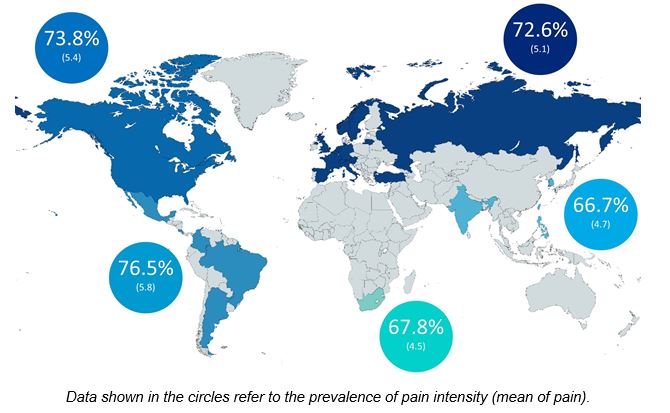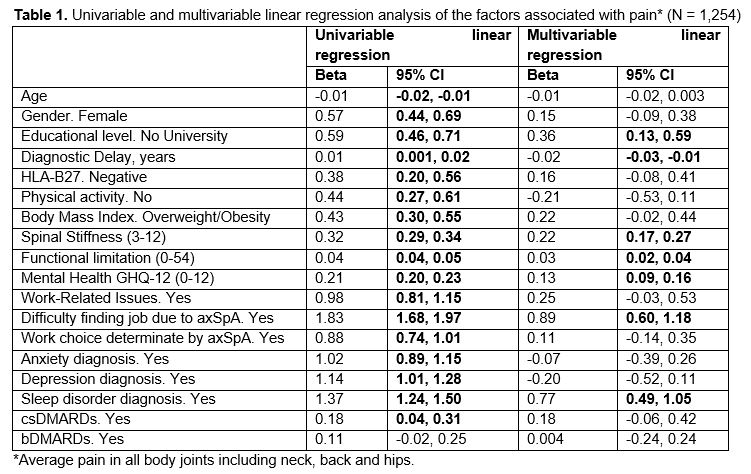Session Information
Date: Saturday, November 16, 2024
Title: SpA Including PsA – Diagnosis, Manifestations, & Outcomes Poster I
Session Type: Poster Session A
Session Time: 10:30AM-12:30PM
Background/Purpose: Severe pain in patients with axial spondyloarthritis (axSpA) can cause deterioration in their physical and mental health. The aim is to investigate factors associated with pain intensity in a large sample of patients from the International Map of Axial Spondyloarthritis (IMAS) study from around the globe.
Methods: IMAS is a cross-sectional online survey (2017-2022) including 5,557 unselected axSpA patients worldwide from Europe, North America, Latin America, Asia, and South Africa. 5,347 participants who reported pain were analysed. Pain (0-10) was assessed using the average of Q2 (axial pain) and Q3 (peripheral pain) BASDAI items. The factors evaluated were sociodemographic, disease characteristics, lifestyle, patient-reported outcomes (including GHQ-12 scale), employment, mental comorbidities and treatments. Univariable and multivariable linear regression was used to evaluate factors associated with pain.
Results: Of 5,347 patients, average of axial pain was 5.7(±2.5), average of peripheral pain was 4.6(±2.7), average overall pain was 5.2(±2.4) and 72.4% reported a high pain intensity (≥4). The average overall pain was the highest in Latin America and the lowest in South Africa (Map 1). Factors associated with higher pain intensity were no university education (b=0.36), shorter diagnostic delay (b=-0.02), greater spinal stiffness (b=0.22), higher functional limitation (b=0.03), poorer mental health (b=0.13), difficulty finding a job (b=0.89), and sleep disorders (b=0.77; Table 1).
Conclusion: Globally, seven in ten patients with axSpA had high pain intensity, with higher proportion in the Americas and lower in South Africa. Pain in patients with axSpA was most strongly associated with the absence of university degree, presence of work impairment as job search, as well as poor patient-reported outcomes. Pain is a critical symptom in axSpA, as it is associated with work impairment and negative disease outcomes so, if patients’ quality of life is to be improved, pain reduction should be a priority in treatment and management.
To cite this abstract in AMA style:
Garrido-Cumbrera M, Navarro Compán V, Sommerfleck F, Bundy C, Makri S, Correa-Fernández J, Akerkar S, Lowe J, Karam E, Poddubnyy D. What Factors Are Associated with Pain Intensity in Axial Spondyloarthritis? Results from the International Map of Axial Spondyloarthritis (IMAS) [abstract]. Arthritis Rheumatol. 2024; 76 (suppl 9). https://acrabstracts.org/abstract/what-factors-are-associated-with-pain-intensity-in-axial-spondyloarthritis-results-from-the-international-map-of-axial-spondyloarthritis-imas/. Accessed .« Back to ACR Convergence 2024
ACR Meeting Abstracts - https://acrabstracts.org/abstract/what-factors-are-associated-with-pain-intensity-in-axial-spondyloarthritis-results-from-the-international-map-of-axial-spondyloarthritis-imas/


